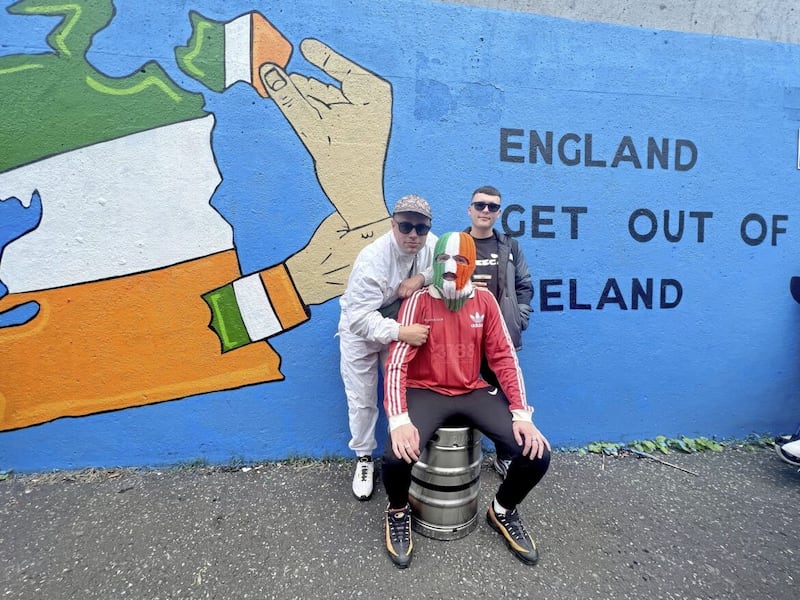Guess who’s back on the news. It’s your favourite republican hoods.
For the uninitiated, these are opening lyrics from the song ‘Get Your Brits Out’ by charismatic Belfast rap trio Kneecap.
Their eponymous Irish language feature film is hitting the headlines after it picked up the Audience Award at the prestigious Sundance Film Festival.
The semi-fictionalised account of Kneecap’s rise, featuring acclaimed actor Michael Fassbender, has been acquired by Sony Pictures Classics for major global markets, and is poised to set cinema box offices alight.
I was lucky to be invited to a preview screening of the movie, starring Naoise Ó Cairealláin (Moglaí Bap), Liam Óg Ó Hannaigh (Mo Chara), and J J Ó Dochartaigh (DJ Próvaí), in Dublin last week.
It’s an outrageous, Trainspotting-esque, anti-establishment wild ride, but also funny, at times moving, and thought provoking, so depending on your cinematic taste you might love it.
It’s guaranteed that those who watch to hate it, or don’t watch and still give their opinion, will make themselves known loudly.
Any complaints from the Tories, the DUP, or anyone else, merited or not, will attract attention and contribute to Kneecap’s success.
When I started out as a reporter it was common for stories to start with unionist politician anger, fury and outrage.
Such stories are still written, but as I honed my craft I stopped using these descriptions, because many unionist people simply aren’t living in a state of perpetual rage.
The outrage factory played out online and in the media extends beyond the arts but there is nothing quite like music, song, theatre, writing, murals and so on to quickly reveal northern society’s predictable angry caricature some still insist on indulging.
You don’t have to like every piece of art, but it is foolish not to recognise the value and benefit to all of us of the arts flourishing here
The Reduced Shakespeare Company ‘bad boys of abridgement’ reminded me just the other day of the DUP’s attempt a decade ago to ban their comedy play about The Bible, which kept me busy writing reports, and did nothing but ensure sold-out shows.
And Cork artist Louise Walsh, ahead of her Imagine Festival discussion in March, has been regaling me with eye-opening stories from the ′90s of attempts by Belfast’s ‘great and good’ to censor her Unknown Woman Worker sculpture.
Art is intended to make people emote but attempts to censor, ban, diminish and limit artistic expression are futile.

Arts roles aren’t just for “fruits and fenians”, as writer Gary Mitchell’s careers teacher once reportedly said. They are for everyone, including provocative republican storytellers from west Belfast and beyond.
You don’t have to like every piece of art, but it is foolish not to recognise the value and benefit to all of us of the arts flourishing here.
I know I sound like a complete luvvie when I say this, but it’s about more than money and entertainment.
It is about nourishing your soul, telling the world about the array of rich cultures in society, and can be therapeutic.
👀A wee sneak peek of Kneecap the movie. 👇
— KNEECAP (@KNEECAPCEOL) December 6, 2023
🎥 The first ever Irish language movie at @sundanceorg - this snippet in the language of the oppressor.
"The Troubles?!" 💥 pic.twitter.com/QoGdFdMqC9
Art is not viewed as vital by some, or funded as it should be, and is often unappreciated by those in power, perhaps because it can be so effective in challenging ideas, elites and norms.
The arts have the exciting ability to drive change so instead of getting angry on repeat we should be harnessing creativity, and investing in all communities so every type of complex story is told.
At the weekend I was also at the QFT’s Brian Friel Theatre for the premiere of the powerful new short play Holding Ground, which is a collaboration between Women’s Aid NI and Tinderbox actors Jack Dawson and Holly Hannaway.
Exploring family trauma and domestic abuse themes, it could make a real-world difference to young people’s lives if performed in schools and youth venues.
While predictable circular arguments about RSE (Relationship and Sexuality Education) focus on controversy, the important healthy relationships elements sadly take a back seat.
We are too often distracted into focusing on the wrong discussions so the bigger picture is missed.

